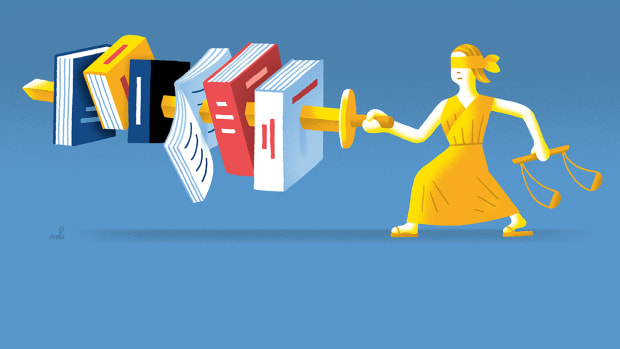
Han van der Maas | Scientists are trapped in the chokehold of commercial publishers
Commercial publishers, with Dutch roots, parasite on publicly funded science, writes columnist Han van der Maas. How can we escape their stranglehold?
The cabinet may fall in the next few months, the education budget may still be disapproved, the realization that we cannot do without foreigners in the Netherlands may suddenly land in right-wing circles, but it is more likely that we are going to cut very hard in the next few years. That means a crisis and, as we know, you must not waste it.
Let us then use this crisis to finally reform our publishing process. Everything about that is wrong. Commercial publishers, with Dutch roots, parasitize publicly funded science. The stranglehold of the publishers operates through many channels (Scopus, Pure, Mendeley) in which especially the sky-high APC costs stand out. For an excellent overview I refer to the a contribution by Christien Boomsma in U-newspaper. The CEOs of Wolters Kluwer and RELX (Elsevier) pocket more than 5 million annually.
It is not so easy to escape this stranglehold. We have become accustomed to the status quo and the convenience of the tools we took earlier. We review for nothing for these publishers or edit for a pittance. Why is that? I do not oversee what our action plan should include but this for sure: The publishing process should be in the hands of the universities themselves.
The model of university-based journals offers opportunities. Scipost is one such fantastic initiative by UvA professor Jean-Sébastien Caux, among others. Scipost guarantees free online access to all publications in all its journals and does not charge for processing articles for publication. But meanwhile, they are almost falling over due to lack of sponsors. We would rather pay 5000 euro APC fees for one article to a commercial publisher. Also read the plea by Wim Pouw and Bert Bakker.
We also need to rethink the journal model in this regard. The system of ‘submit, review, reject, resubmit elswhere until accept’ leads to enormous blockage. I am a proponent of author-based publishing as applied, for example, by Elife. The author decides on publication.That sounds strange because anyone can publish anything. But it is precisely this idea that ensures that much publishing is no longer an end in itself. It is about citations and these decline if one publishes a lot of mediocre work.
Another issue is the move to open source software. Open source alternatives exist for almost all commercial software, which universities often discourage because of privacy risks. This is a mistake. Precisely commercial parties, including Microsoft, misuse our data en masse. A shocking overview is given by Eiko Fried who requested his data from Elsevier. But here the same thing happens as with Scipost. UvA researchers developed JASP, an open source (and free) alternative to SPSS. Despite the fact that JASP is used worldwide for education and research, organizing structural support for JASP proves to be quite a challenge. Rather, people pay a very expensive annual SPSS license, because “JASP is free anyway”.
One of the reasons I can't oversee an action plan is that we don't know the numbers. What does UvA's surrender to Microsoft actually cost? And what is the cost of all kinds of software like SPSS? Many of these arrangements are secret. Universities also pay very different amounts for journals.
Fortunately, we have many sensible people in the house who, I notice, have already given this a lot of thought. I almost do not dare say it, but perhaps the UvA should create another committee. Assignment: how do we get rid of the commercial publishers and move to open source systems for science and education. I think that could save the UvA about 5 million or so, which is 50 jobs after all.


